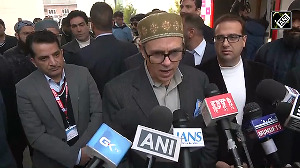The stringent National Security Act was imposed on Saturday night by the Rajasthan government in 11 districts hit by Gujjar-Meena clashes and Gujjar violence over ST status issue. The Army also conducted an aerial survey of the affected regions.
NSA has come into force and will remain in operation for the next three months in Bharatpur, Dausa, Karauli, Sawai Madhopur, Tonk, Bundi, Kota, Baran, Jhalawar, Ajmer and Jaipur areas, Home Secretary V S Singh announced.
Under the Act, district authorities are empowered to arrest without warrant those indulging in arson.
Senior officers of the Army, which was called out following the large-scale violence by Gurjars, carried out a helicopter survey of Bharatpur, Dholpur, Alwar, Dausa, Karauli, Sawai Madhopur, Jaipur rural, Kota and Tonk to assess the situation and review traffic movements.
For the first time since Tuesday, when the violence over the quota issue erupted, Chief Minister Vasundhara Raje joined the talks with community leaders in a bid to resolve the current crisis in the state.
While Gujjar protestors in Sanganer district set fire to a railway station, reports of stray incidents of arson were reported from some other parts of the state.
Barring these, the arson-hit districts were by and large peaceful, a senior official said.
In Laalsoth in Dausa and adjoining Karauli districts, which witnessed Gujjar-Meena clashes on Saturday, resulting in the killing of five persons and injuries to several others, tension prevailed between the two communities as the security forces conducted flag marches.
Senior officers of the Army, which was called out following the large-scale violence by Gujjars, carried out a helicopter survey of Bharatpur, Dholpur, Alwar, Dausa, Karauli, Sawai Madhopur, Jaipur rural, Kota and Tonk to assess the situation and review traffic movement following the caste clashes.
On the government-Gujjar talks front to end the crisis over the ST quota issue, the fifth round of which was being attended by Raje in Jaipur, a senior government official told reporters that they have begun in a 'cordial' manner.
Atleast 26 people have died in the violence, including five who were killed in Gujjar-Meena clashes on Saturday.
In Sanganer, Gujjar protestors set fire to a railway station, which destroyed the communication system and large number of documents.
They sprayed petrol after pushing out a sole employee allegedly in the absence of Railway Protection Force personnel before setting it ablaze.
Additional DGP (Law and order) K L Bairwa told PTI that Rajasthan Home Secretary V S Singh and DGP A S Gill also flew in a helicopter for an aerial review of the situation in the affected districts.
As a precautionary measure, the government has sealed in certain sensitive areas Rajasthan's borders with Haryana and Uttar Pradesh and has asked security forces to allow only entry of bonafide people into the state, a senior police official said.
These steps have been taken in view of agitation by Gujjar in the neighbouring states.
The official said additional forces were deployed at all stations on Jaipur's Gandhinagar, Durgapura, Jagatpura and other railway stations in the region following the burning down of the station.
Bus services on the Delhi-Jaipur highway, which was closed to traffic following road blockades set up by the agitators, was resumed as the Army and security forces maintained a strict vigil.
After four days of disruptions, some train services were also resumed on Saturday on the Delhi-Mumbai route via Gangapur city, the Railway Ministry said in New Delhi.
However, several trains passing via Rajasthan and connecting Delhi and other cities continued to be suspended or terminated before their destinations.





